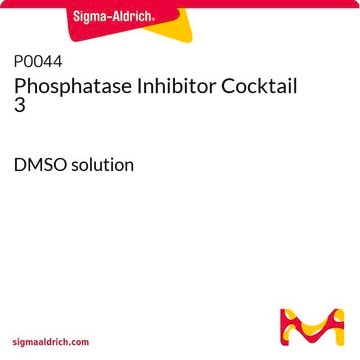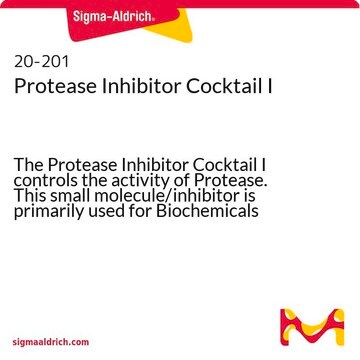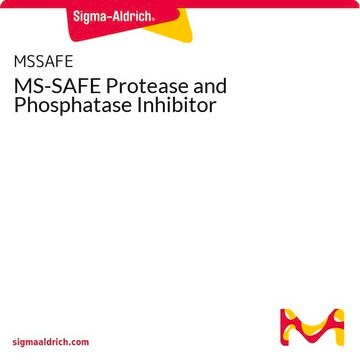P9599
Protease Inhibitor Cocktail
DMSO solution, for the inhibition of serine, cysteine, aspartic, metalloproteases and aminopeptidases, for plant cell and tissue extracts, DMSO solution
Sinonimo/i:
Protease Inhibitor Mix
About This Item
Prodotti consigliati
Nome del prodotto
Cocktail di inibitori delle proteasi, for plant cell and tissue extracts, DMSO solution
Livello qualitativo
Stato
DMSO solution
Temperatura di conservazione
−20°C
Cerchi prodotti simili? Visita Guida al confronto tra prodotti
Descrizione generale
Specificità
Applicazioni
Azioni biochim/fisiol
Caratteristiche e vantaggi
Optimized and tested for use with plant tissue and cell extracts
Specifically tested on plant seedling extracts from pea, bean, wheat, tobacco, and Arabidopsis, as well as leaf and root extracts from pea, wheat, and tobacco
One mL of solution is recommended for the inhibition of protease activity in 100 mL of cell lysate from 30 g of various plant tissues or 10 g of baculovirus-infected cells
Componenti
Bestatin
E-64
Leupeptin
Pepstatin A
1,10-Phenanthroline
Avvertenza
Quantità
Nota sulla preparazione
Prodotti correlati
Codice della classe di stoccaggio
10 - Combustible liquids
Classe di pericolosità dell'acqua (WGK)
WGK 1
Punto d’infiammabilità (°F)
185.0 °F - closed cup
Punto d’infiammabilità (°C)
85 °C - closed cup
Scegli una delle versioni più recenti:
Certificati d'analisi (COA)
Non trovi la versione di tuo interesse?
Se hai bisogno di una versione specifica, puoi cercare il certificato tramite il numero di lotto.
Possiedi già questo prodotto?
I documenti relativi ai prodotti acquistati recentemente sono disponibili nell’Archivio dei documenti.
I clienti hanno visto anche
Contenuto correlato
Select different protease inhibitor types based on your needs to prevent protein degradation during isolation and characterization and safeguard proteins in sample prep.
Il team dei nostri ricercatori vanta grande esperienza in tutte le aree della ricerca quali Life Science, scienza dei materiali, sintesi chimica, cromatografia, discipline analitiche, ecc..
Contatta l'Assistenza Tecnica.
















